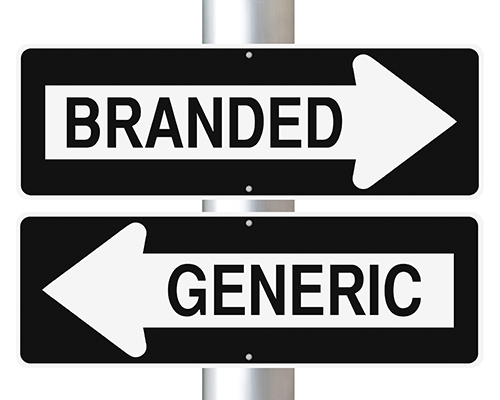
Perhaps you’ve come home from a recent trip to the drugstore to find that your prescription for a brand-name drug has been filled with a generic version. But do generic medicines work the same as branded medicines? According to the US Food and Drug Administration (FDA), the answer is yes.1 But there can be differences between them, too. Read on to learn more about the similarities and differences of generic vs brand-name drugs.
What is a brand-name drug?
A brand-name drug is a medicine that is discovered, developed, marketed and sold by a pharmaceutical company.2 To bring a brand-name drug to market, the company must get approval from the FDA.2 The company does this by submitting data from studies demonstrating that the drug is safe and effective.2 But this process often is lengthy and expensive.3 According to a 2014 report published by the Tufts Center for the Study of Drug Development, the cost of bringing a new prescription drug to market is about $2.6 billion.3
What is a generic drug?4
A generic drug is created as an equal substitute to a brand-name drug and is often developed and made by a company other than the company that makes the brand-name drug. The generic drug has the same active ingredient, dosage form and strength and is designed to be used the same way as the brand-name drug. Generic medicines must also meet the same quality and manufacturing standards as their brand-name counterparts.
A generic drug may not be exactly the same as the brand-name drug, however. For example, the inactive ingredients in the generic version may be slightly different than the brand-name drug, as long as these differences do not impact the demonstration of bioequivalence to the brand-name drug.
What is an authorized generic drug?
According to the FDA, the term “authorized generic” is used to describe an approved brand-name drug that is marketed without the brand name on its label.4 With the exception of the fact that it does not have the brand name on its label, the authorized generic is exactly the same as the branded product.4
An authorized generic may be marketed by the brand-name drug company, or another company (with the brand-name company’s permission).4 Even though authorized generics are exactly the same as their branded counterparts, some companies sell their authorized generics for less.4
One example of an authorized generic is . Generic Colchicine 0.6 mg Capsules were introduced in 2015 by West-Ward Pharmaceuticals Corp. (maker of Mitigare® [Colchicine] 0.6 mg Capsules). Today, Hikma (formerly known as West-Ward Pharmaceuticals Corp.) is a company that offers lower-priced alternatives to branded pharmaceutical products.5 As of 2019, Generic Colchicine Capsules marketed by Hikma Specialty continue to be the lowest-priced option.6
Why are generic drugs and authorized generic drugs less expensive?4
Because the active ingredients in generic drugs and authorized generic drugs have already been proven effective by the brand-name drug manufacturers, these studies do not need to be repeated. Therefore, it is far less costly to get FDA approval for a generic drug than a brand-name drug. Fortunately, many generic drug companies pass this savings along to patients and the US healthcare system.
How can I save on my colchicine prescription?
If you take a brand-name colchicine product and want to switch to the lowest-priced option, talk with your doctor. Although colchicine capsules and tablets are not exactly the same medicine, Generic Colchicine 0.6 mg Capsules may be right for you. If you already have a prescription, ask your pharmacist if it can be filled with Generic Colchicine 0.6 mg Capsules.
To save even more, ask your doctor or pharmacist about the True Blue Savings Card. With the True Blue Savings Card, eligible patients can receive Generic Colchicine 0.6 mg Capsules for as little as $0 for 30 days and get $5 refills.*
*For all eligible patients 18 years or older who are legal residents of the United States or Puerto Rico. First 30 days are as little as $0 only for eligible patients. Maximum savings of $65 on the first fill and $50 on refills. Please see mitigare.com for complete Terms and Conditions.
NOTE: This article was not written by a medical professional and is not intended to substitute for the guidance of a physician. These are not Hikma’s recommendations for gout flare prevention, but rather facts and data collected from various reliable medical sources. For a full list of resources and their attributing links, see below.
